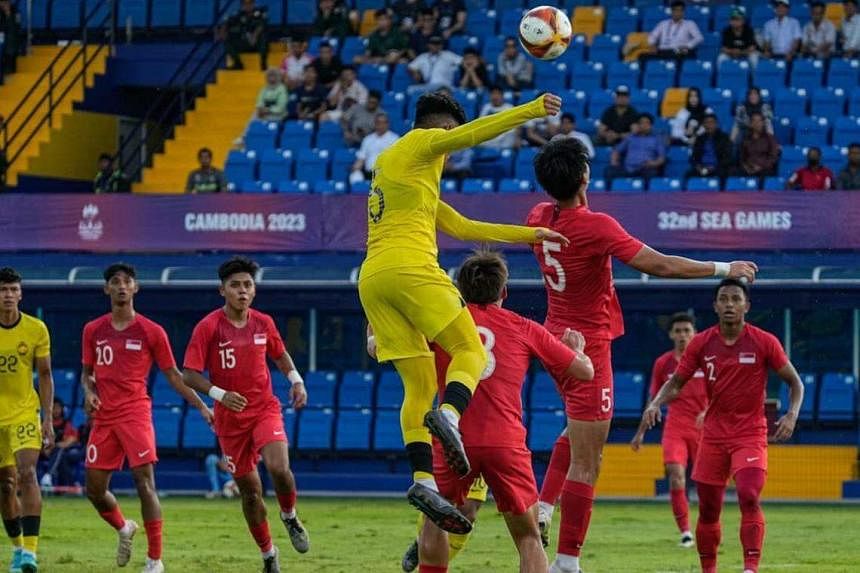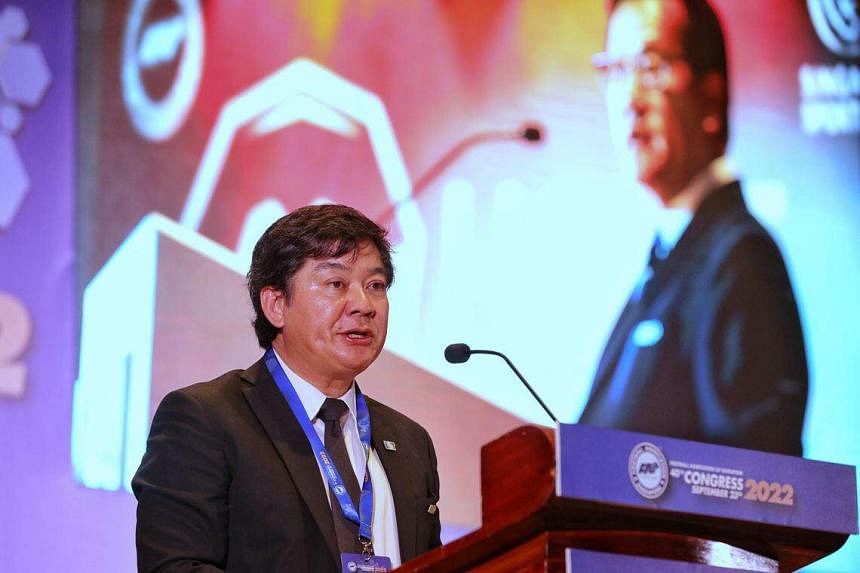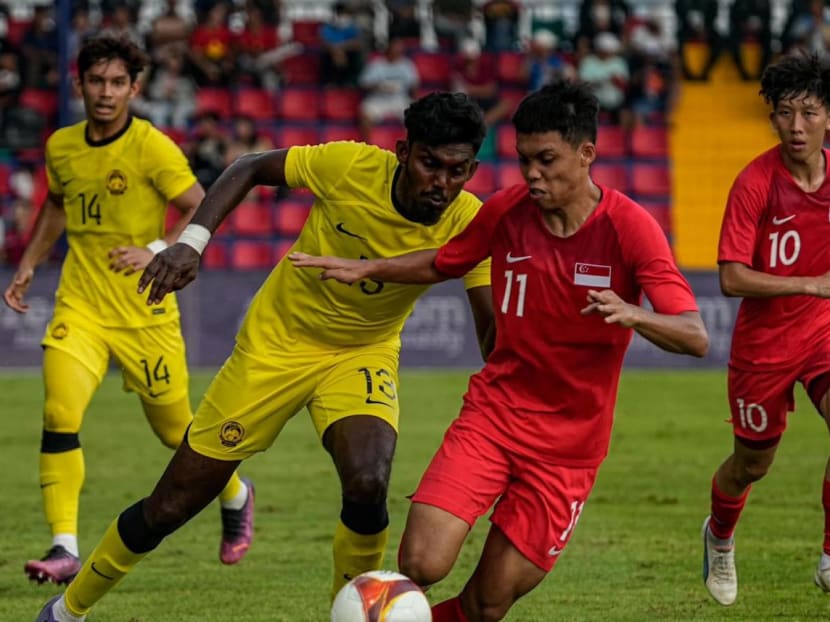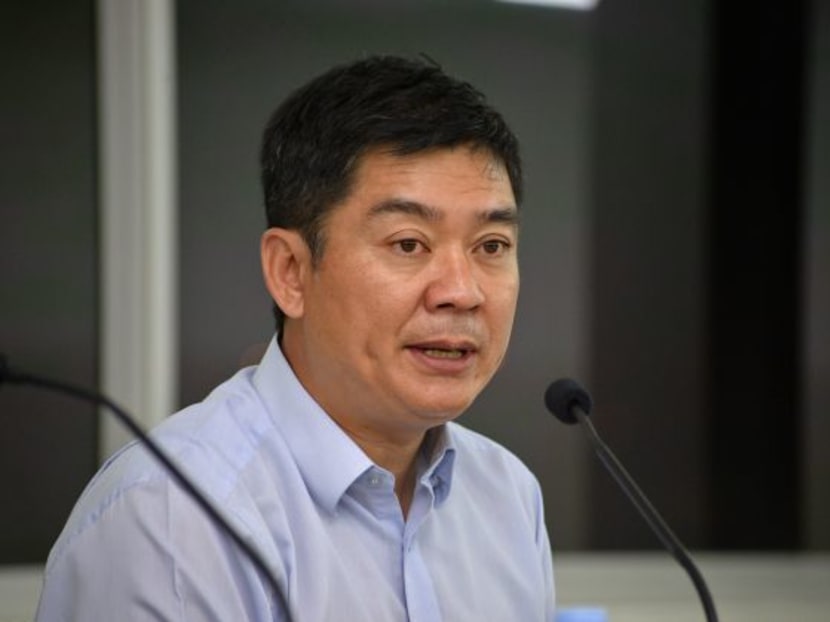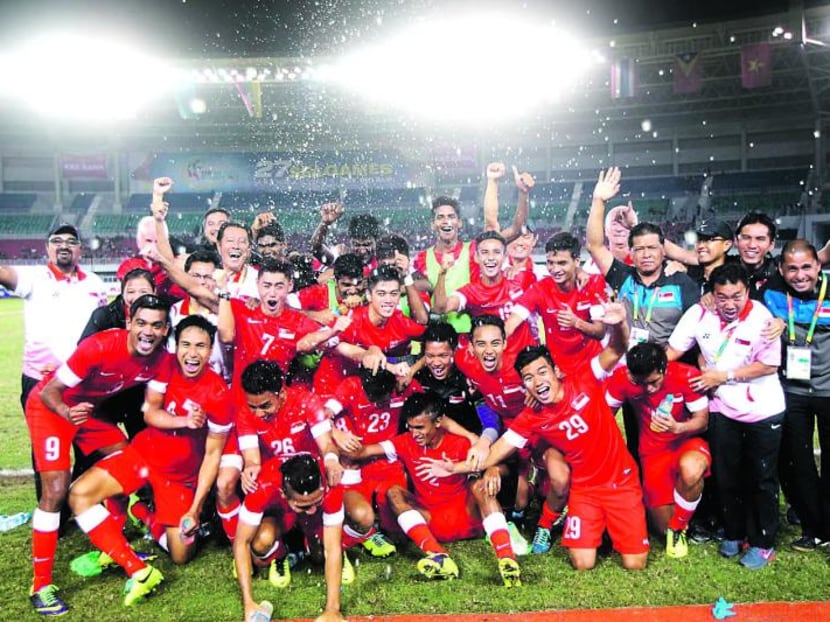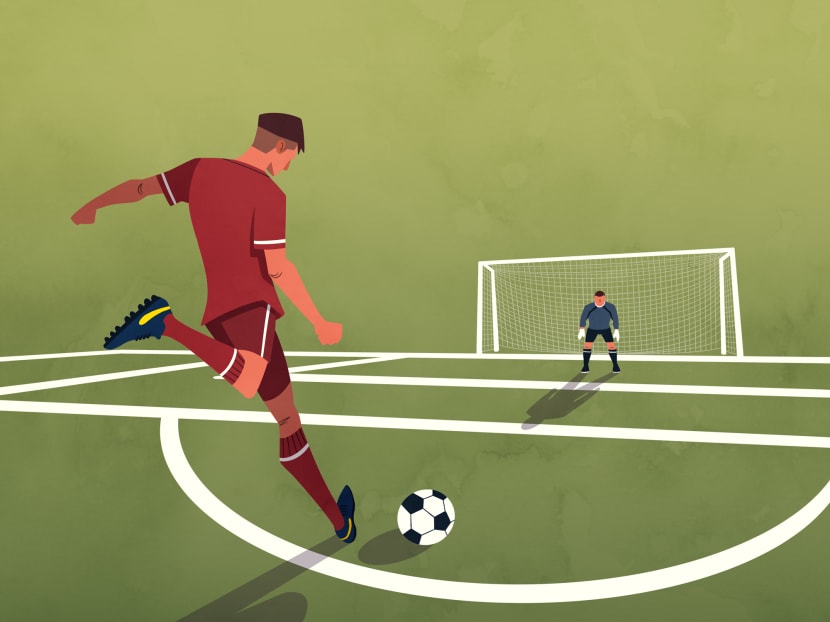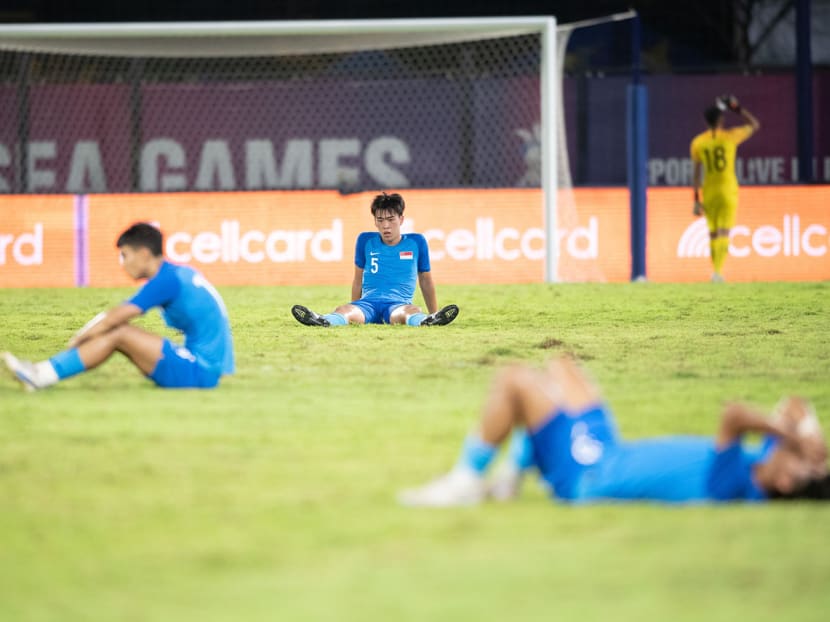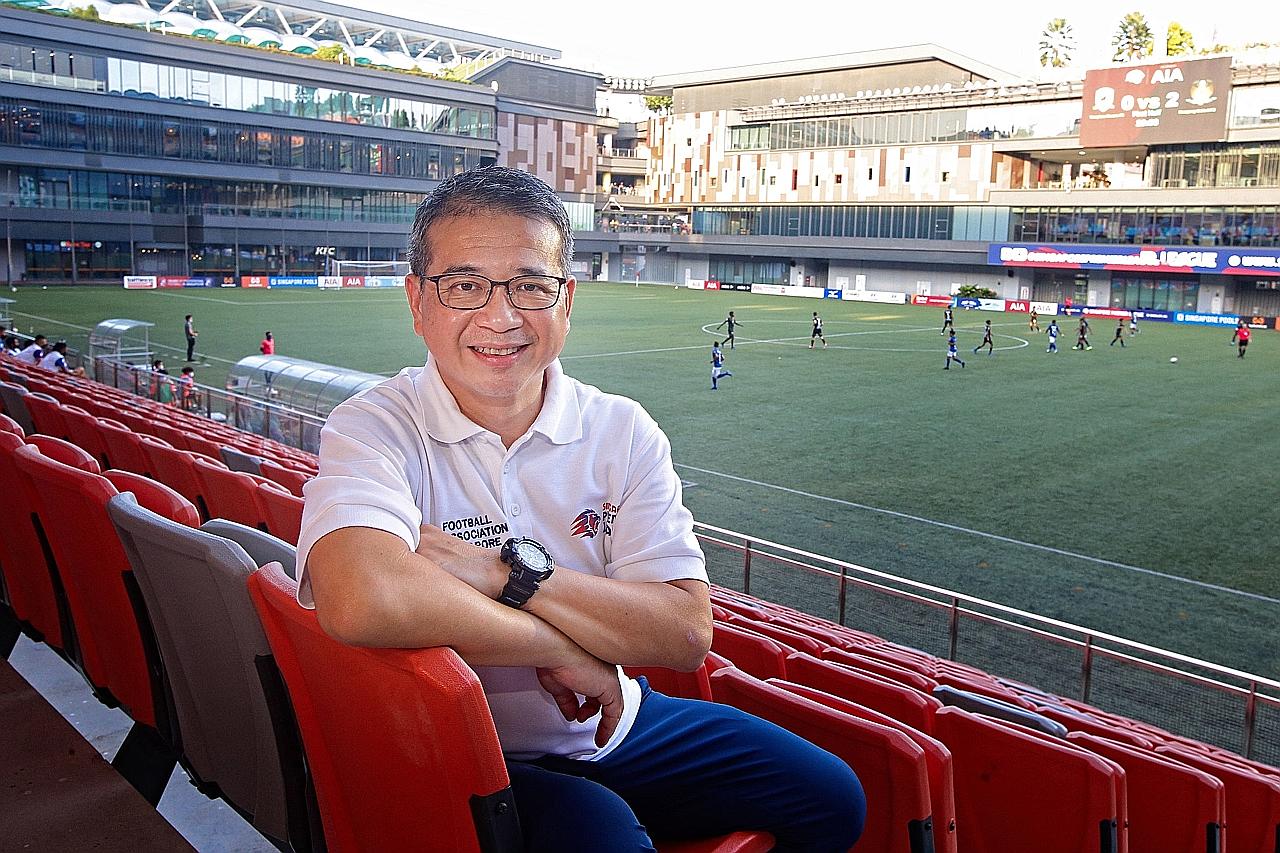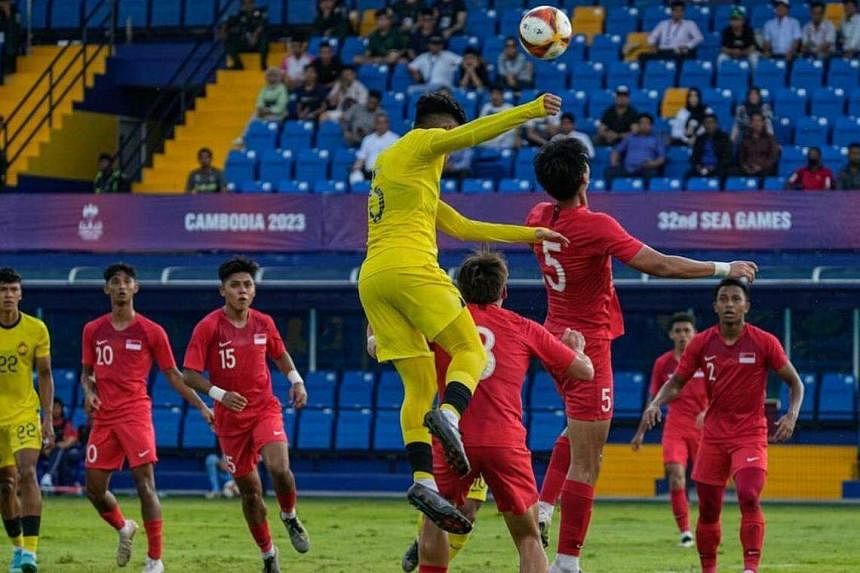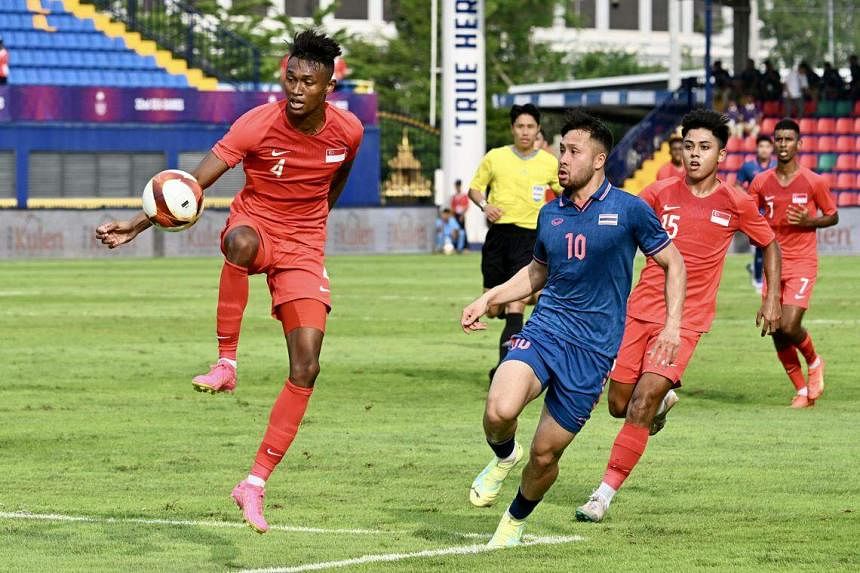The Big Read: Goal 2034 — hard-hitting questions answered on Singapore’s ‘big, hairy, audacious aspiration’
Anam Musta'ein/TODAY
The announcement has been met with some public scepticism, given Singapore football’s current state of affairs and the failure of a similar project to qualify for the 2010 World Cup.
Follow us on
TikTok and
Instagram, and join our
Telegram channel for the latest updates.
@JustinOngTODAY
Published March 20, 2021
Earlier this month, the Government launched a new national project which aims to raise the standard of football among young Singaporeans. The latest project, dubbed Unleash the Roar, is related to the Goal 2034 ambitions mooted by the Football Association of Singapore (FAS) two years ago to have the national team, also known as the Lions, qualify for the 2034 World Cup. The announcement has been met with some public scepticism, given Singapore football’s current state of affairs and the failure of a similar project to qualify for the 2010 World Cup.
With the work cut out for the people behind the project to win over the sceptics, TODAY supervising editor Jason Tan and journalist Justin Ong put the tough questions to the project co-chairs, FAS deputy president Bernard Tan and Sport Singapore chief executive officer Lim Teck Yin, as well as FAS technical director Joseph Palatsides and ActiveSG Football Academy principal Aleksandar Duric. Former-professional-footballer-turned-lawyer Sudhershen Hariram and national youth footballer Zikos Chua also joined in the roundtable discussion.
Here are the excerpts:
Jason: We had Goal 2010 and then in 2015, former FAS technical director Michel Sablon also said that Singapore could play like Japan by 2020. So how is Goal 2034 different, and how will things be done differently?
Bernard: I think football is very important for Singapore. It is an emotional topic, it is the most played and watched sport in Singapore and all of us actually do want Singapore to be better. The question we all need to ask ourselves is, have we tried our best? And let's say we have fallen short of some targets in the past, is it right to give up? And the constant refrain I get in the football community is no, because we can do better… What is important is to take events of the past, learn the lessons and move forward. And surely all Singaporeans know: we cannot give up the first time we fall, right? The Singapore spirit is you fall, you pick yourself up, you go again. That is the spirit of sports, that's the spirit and attitude we want to have, and certainly that's what we want to actually deliver as we move forward. So I assure you that we are very cognisant of what we did in the past, and this project is fundamentally different.
Teck Yin: Over the years, we have had continuous discussions with different FAS leadership around aspirations, targets and approaches… And I must say that this particular project is probably one of the most well put together projects that I've seen coming out of the FAS over the years. It is clear about the aspiration and ambition with respect to setting an audacious goal that can excite and challenge the younger generation. When you think about football as the process and the journey, you cannot just be focusing on your senior team, you cannot just be focusing on your under-23 team. We've always known that you need to focus on the children and youth who are starting to play and are in school today. But the question is, how would you frame the aspiration that excites that generation — frame an aspiration that gets the parents of that generation saying, ‘I would encourage my children who want to play football, to get them involved in a programme, and I can see that there's a plan to put in place a good quality programme that will be beneficial to my child’? … I think this project must be clearly focused on what it means to bring Singaporeans on a journey that would be, if you like, bringing back that Kallang Roar, giving that opportunity for another generation of Singaporeans to be able to experience how we as Singaporeans journey together as a nation… So I want to commend the FAS for coming up with a big, hairy, audacious aspiration like this one.
Jason: I’m not quite sure if both of you answered the question on how will it be different this time round, from Goal 2010…
Bernard: When Goal 2010 was announced, it was really an emphasis on trying to naturalise foreign talent into the squad. That actually brought some success — remember we actually won the Suzuki Cup, that's not something to toss away. But if we want a lasting long term success, we need the base of the Singapore team to be homegrown… And this means a huge investment in developing rather than naturalising talent… Unleash the Roar is all about investing in our children, and giving them an opportunity to play football at the highest level. The second thing is this idea of a pathway to excellence. If we want to qualify for the World Cup or to be the best in Southeast Asia, let's not beat around the bush, our best players need to play in the best leagues in the world. Every single country is looking at the same thing. This means we need to give pathways for our very best to experience football in ecosystems that are far in advance of us, for our footballers growing up to experience football in Europe, for our professional footballers to be playing in quicker, faster, more stringent leagues around the world. I say the domestic league will actually benefit from that push, because we have players playing in Europe, you can bet your bottom dollar that the domestic league will also improve, because players are knocking at the door of Europe. I just want to remind readers of just two things: The whole of the Iceland national team plays in Europe, the whole of the Brazilian team plays in Europe, except for three players. Europe is the big ecosystem but even if we managed to get our players to Japan and Korea, that’s important. The third big difference and I want to appeal again to all parents is this time, we have aspiration for girls. We think it's important for the girls team to also see success in football, because it is a popular game and is growing in popularity, and we want our girls to also experience it.
Jason: Some Singaporeans are also asking where is the accountability for all these past objectives? Has any post mortem been done to see why we didn't achieve some of these goals, and what were the lessons learnt?
Bernard: When we formulated Unleash the Roar and Goal 2034, it was based on absolutely learning from what we could have done better and Goal 2010. For us to achieve huge aspirational goals… we need the whole of Singapore to pull it together. It cannot be done by one agency, it is almost impossible unless the whole of Singapore comes together.
Teck Yin: We need to recount some of the key milestones and the key events that football went through post 2010. So 2012 you have a Suzuki Cup victory, led by a very successful national coach, as well as an ageing Singapore team... We then talked about rebuilding; rebuilding the national team, rejuvenating, and we kept a near term focus on SEA games 2015… the effort to think about that rejuvenation led the FAS council to work with the Malaysian counterparts to get Singapore back into the Malaysian league. The conversations on this particular project didn't just happen in 2019, It started before, early in the term of the current FAS Council. This discussion culminated in an expression of that ambition in 2019. Plans got a little bit scuttled and derailed by the pandemic, and so we see a blank year. And now we are in 2021. But the average age, as well as the focus of the new Singapore Premier League (SPL), is consistent with where we are trying to go. Therefore, the SPL will have a distinct role in this project, especially in relation to the discussion on pathways of players through the domestic leagues to overseas leagues. So, it's not that nothing was done, but I think we have to remember the context of the day, and how things needed to be managed as we progressed. And a transformation that's required is never an easy transformation.
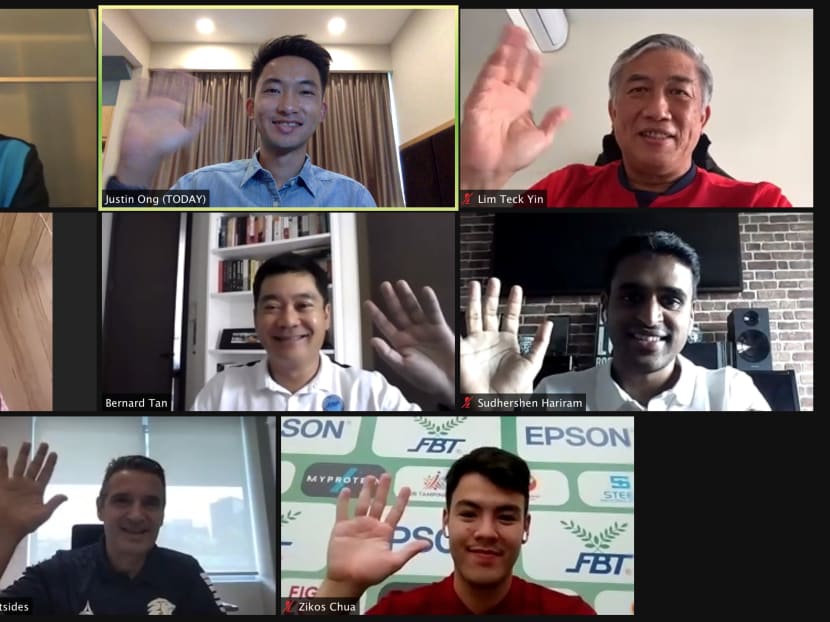
In a roundtable discussion on a new national project which aims to raise the standard of football among young Singaporeans are (Top row, L-R) TODAY supervising editor Jason Tan, TODAY journalist Justin Ong, Sport Singapore chief executive officer Lim Teck Yin, (Middle row, L-R) ActiveSG Football Academy principal Aleksandar Duric, FAS deputy president Bernard Tan, former-professional-footballer-turned-lawyer Sudhershen Hariram, (Bottom row, L-R) FAS technical director Joseph Palatsides and national youth footballer Zikos Chua. Photo: Zoom screengrab
Jason: In the past, it was common to see kids playing football in void decks of housing estates, but we don't see this anymore. How can we continue to make sure that football can be played almost anywhere?
Bernard: One thing to understand is that we live in an urbanised country that is very densely populated and we are trying to promote a game that requires open spaces... it is something that we will look at. You can see reconstruction of different kinds of facilities in Housing and Development Board estates, but more importantly, we need to have a long term view of how we use our limited areas. We have only about 200 to 300 fields in Singapore, and we need them to be heavily used. The two things I've been pushing for are more dual use fields, to have more fields become artificial because then you can take heavy loads. One of the problems of grass fields is once it rains right it gets so soggy, that you can't play. We in Singapore must regard grass fields as a luxury, although we still need to have some. And then, if we can install floodlights, then we can continue to provide night playing opportunities… In many temperate countries, you can play at noon and still be fine. In Singapore, you can't do that. So we have constraints but that's something that we shouldn't complain about. We accept our constraints, let's see how we can overcome them.
Zikos: In Singapore, I did experience playing at a void deck, although there were the occasional times when you'll be chased out by neighbours and sometimes you will even have the police called on us. But I think if the Government could do a better job in allowing kids to play at the void decks... you develop skills, a lot of competitiveness, a lot of fun... A lot of the top players in Brazil, they don't come from organised academies, they come from favelas (low-income informal settings) and that’s where they developed all their skills.
Teck Yin: We acknowledge that in all sports, unstructured play on a daily basis, outside of programmes that parents sign the kids up for are a very important part of skills and social development. Zikos is absolutely correct that when we look at the successful football-playing nations, or in any particular sport, the opportunity for getting out there on a daily basis for children to play in unstructured settings, outside of programmes, is an important part of that development. Ironically, in Singapore, given the amount of structure and system, and how we manage facilities, we would probably need a structure to allow unstructured play… we actually have spaces that people can play, but a certain level of marketing, encouragement, and even ironically, programming, might be necessary to help people understand what's accessible and available for them to do so. Of course, I would have to encourage town councils not to lock the futsal courts and only make it available based on booking. There's obviously some concern around vandalism and maintenance and stuff like that. But if we are going to do this well, we need to keep (spaces) open… Specific to this project, we will be looking to ensure the accessibility of these spaces in neighbourhoods.
Justin: National Service (NS) has always been seen as a challenge to aspiring football players. How will it be different this time round and what kind of support can footballers realistically expect?
Bernard: If you look at the development of a footballer, it’s a late development sport. You can be a gold medal gymnast at the Olympics at the age of 15, you can actually be quite a strong swimmer by the time you're 17, 18. But if you want to make it at a top level of football, usually people tell you, you peak at 26, 27. The critical ages for the development of football is from 18 to 21, perhaps to 23... Obviously there are exceptions, you see people who are playing at 16 and 15 at the adult game. But in general, the ages of 18 to 21 are extremely crucial. And obviously, that's when NS is served. So really, we have looked at ways in which we can work with NS, to see that the development of the footballer is not compromised. One way is early enlistment. If you can enlist at 16 and a half or sooner, you're really at the bottom of the (development) window of 18 (when you complete full-time NS), and you still have your whole career to develop. I think that is the way I will frame the challenge: Not that we cannot do NS but that we need to keep the development window.
Justin: You said that one aim is to send players to overseas leagues. But there was the whole saga with Ben Davis. Will there be any exemptions or deferments granted for people to play in overseas leagues?
Teck Yin: Whenever we talk about Ben Davis, we must not misconstrue the context of the conversation. The issue for Ben Davis was very simple, the moment Ben Davis and his family were not willing to commit when Ben Davis will come back to Singapore, that was the end of the conversation. You have grown up in Singapore, you have benefited from the Singapore system. NS is an obligation to keep a successful and secure Singapore going. We owe that to the whole country. At the systems level, we have always worked with the Ministry of Defence (Mindef)... the Singapore Armed Forces sportsman scheme is one such scheme that enshrines that policy of balance in implementing the schemes. We have always looked at the specific circumstances of a specific athlete and the campaign. So, whether it's early enlistment, whether it's delayed enlistment, or even enlisting at the end of your polytechnic education for many of the Sports School students who move to the Institute of Higher Learning, It is discussed in the specific context of the athlete and the campaign. So, we will engage in this discussion with Mindef in the same way. Fundamentally, is deferment absolutely necessary, or is this a case where early enlistment is better suited? Or is this the case that the particular athlete is still studying at one of our polytechnics while plying his skills on the football field, and therefore can enlist after that, and does that relate to a particular SEA Games campaign? So we will have to look at the circumstances… but at no time should football distract us from the NS obligation. And at no time should we allow the Ben Davis case to be used or construed as something it is not.
Justin: I understand Zikos is going to enlist in April this year. What are your hopes for your enlistment experience?
Zikos: I'm quite looking forward to it. because it is going to be a new experience for me, but at the same time, it's very high up in my goals that I am able to play and train consistently at the same time.
Teck Yin: Let me share a conversation I had with Zikos when he was 16 years old. I asked him, I said, ‘What is your pathway?’ He looked at me a little bit puzzled. He said, ‘I don't know what you mean by pathway’. I said, ‘what's your next step in football?’ And he said to me, ‘I don't really know. I just want to play as much as I can play.’... In this project, players need to be mentored, with respect to the pathway and the options. Children and youth come into the game, passionate and enthusiastic to play, have fun, and at some point to be the best player they can possibly be… I'm assuming that Zikos wants to represent Singapore at the senior national team. He's an intelligent lad (who has) found ways to play football and to study… very clear in his obligations about going to NS. But the conversation that we need to have with Zikos, is how do we keep your skills, how do we keep your fitness, how do we give you a football pathway, during NS and beyond. It cannot be a black hole... and this project is meant to make sure that at even a younger age, football and the future for youths is not a black hole.
Joseph: Every player could be different as well and that's why we have to be open to all different scenarios... A lot of players who are ready to enlist have different pathways. There's the educational element, the academic element that we want to consider, and maybe some issues, such as personal family issues that we have to consider. There’s no right or wrong in all this... we have to work within the guidelines, and all we need to do is just enhance them to make sure that there's continued development during this period of time and Zikos made it very clear that he's looking forward to how NS can shape him as a person as well which I think it's very important to take away. But at the same time, he wants to see how best he can continue to develop as a footballer... NS is a big part of Singapore and we respect that to the utmost. What we need to do is just develop a plan, and it's great to see that we've got open communications, and a willingness to make things better.
Jason: What if Zikos gets enlisted into a combat vocation? How then do you work with Mindef to ensure that his so-called footballing pathway remains at the highest possible level for him?
Teck Yin: Rather than talk about his case, I'd rather talk about my case. Because I played with the national water polo team for 12 years. And in all of those 12 years I was in the army. There were even occasions where I had to train and prepare and play when I was a commanding officer of a battalion. There were occasions when I found myself in Brunei for extended periods of time. I dare say that the mentality and the mindset of being able to adapt to your situation and put in the work that you need to put in is a critical component of an intelligent and successful athlete. Conditions, even beyond NS, may never be ideal for the player or the athlete. You may be free of NS, but you may be dealing with a nagging injury. You may be free of NS, but find yourself playing in a professional league, but also desiring in your own aspiration to work in another job. We have many national athletes who compete at a very high level, at the global level, who actually desire to do some form of work. So I think we have to be able to deal with the specifics of the day for the players in question. In the other case of the swimmers that we had to look at for deferment, there was a clear physiological and performance degradation in their performance in the water-based environment that we were able to track. That enabled us to seek long term deferment. So different sports are a bit different. And I think football in this case, can do the work with NS. And people may disagree... but I would hope that our footballers will not only just embrace NS, but use that as an opportunity to become a stronger athlete.
Aleksander: I served in the army also when I was growing up… I joined the army when I was 17… and I also became an officer. My time spent in army made me grow up as a person, become stronger mentally and physically. I juggled all my officer duties with football training. I think we are just asking too many excuses… NS is one of the good things in their lives. This can be done, they just need to really balance everything, (know) what you really want. And maybe from their military camp, we can work closely with them, maybe give them some special training to do on their own, or send some coaches inside the camps, and get them maybe to train a couple of times a week in camp.
Sudhershen: The easy option may be to just say that it's so difficult… or you can try and do something about it. And then there's the other part of it which is what the people who make the decisions can help you with. So it's good to hear that it's on a case-by-case basis. You can’t just have a cookie cutter sort of policy that applies to everyone… it has to be a holistic thing where everything is taken into consideration and we move away from the mindset of thinking that it's an either-or situation… The realities of how we are in Singapore, whether it's NS, whether it's education, they have to coexist… And I do agree that in NS, certain experiences you go through are transferable to your footballing career — the way you approach things, your mental strength, and it does make a difference. And then you have to also take the initiative to try and make things work, sometimes they won't. But you will never know until you try.
Justin: The state of the domestic league is putting some people off pursuing a professional football career. How will FAS work with parents and change their mindsets on football as a viable career?
Bernard: Anything that we do in the Singapore Premier League is actually a decision that's made in conjunction with the club chairmen so I'm not going to touch on specific changes. Maybe what I can offer is a perspective of sports as a career. There's an increasing number of parents who believe that the stairway to achievement is not just in academia. To be a well rounded person, you need something else, whether it's in the music or the arts, or in sports. I want my child to have multiple experiences... We have progressed in society, where there are multiple routes to achievement. With that as a backdrop, I think more and more parents will be allowing their kids to pursue their love for sports. What we are offering is a chance for you to go as far as you can, a stairway to go right to the very top... I want our best players to be playing in the best leagues in the world.
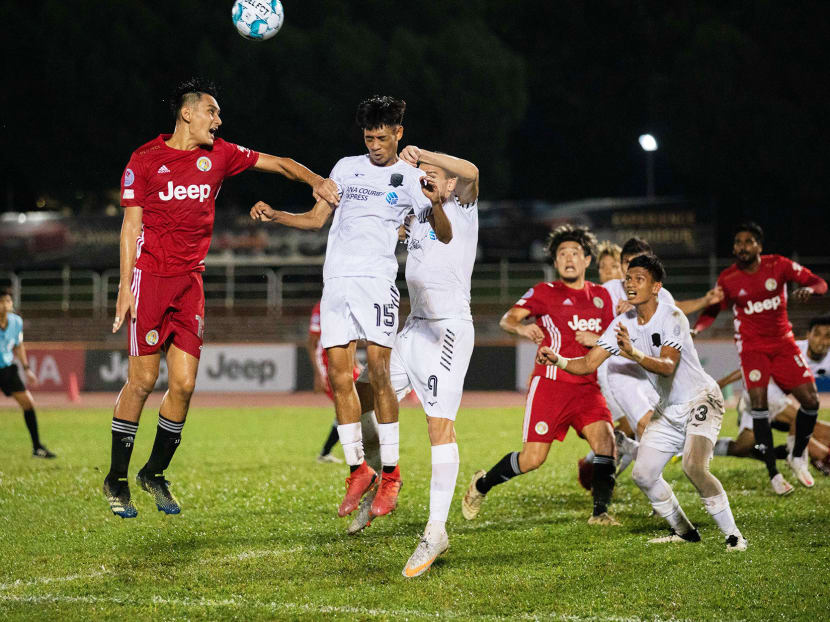
A Singapore Premier League match between Balestier Khalsa FC (red) and Tampines Rovers FC (white) at Toa Payoh stadium on March 17, 2021. Photo: Ili Nadhirah Mansor/TODAY
Justin: Zikos, what are your hopes for your career in football?
Zikos: I think that Goal 2034 provides a clear target for us as footballers that we should work towards on a daily basis. I hope to see myself playing in perhaps a top Asian league or even in Europe, in the future. And I would like to see how far football can take me and give my best.
Joseph: I don't think anyone plays a sport (thinking) about what job I can have at the end of it all… If you ask Aleksandar, how was it when he won the Suzuki Cup? Will he ever forget those moments, for example? No he won’t. And when you win a gold medal or when you win a last minute community game because you scored a goal at the end or the goalkeeper saved the penalty shootout, they are the moments that enrich your life experiences. If you make a career out of it, then that's just a bonus. But I think getting people to be involved in the game, whichever game it is, and giving them different pathways... they're the type of things that we want to provide for the children of Singapore. After that, if we grow our ecosystem to the level that we all desire, then I think those opportunities will rise for everyone in different roles which could be football related or not.
Sudhershen: There seems to be a prevailing mindset — I don't know whether it's peculiar to Singapore — that just because you play football (professionally), you're entitled to a job after that, and that you have to be taken care of. I don't think that's fair. You go into it with your eyes open, and nobody owes you a job after that to make sure that you're employed for the rest of your life, whether in football or not. It cannot be the case that anytime you join a company, it is then responsible for the rest of your life right? So it's good to hear that there will be jobs available for the players to choose, whether they want to go and apply for it or not.
Jason: Bernard has suggested that Singapore models itself after Iceland, by having its football talent play in overseas leagues. How will FAS prepare Singaporeans for that? What other lessons has it learned from Iceland?
Bernard: First, the question is, why do we want to aim high? In 14 years, do we anticipate that more and more Southeast Asian players will be playing in Europe? And the answer must be yes. Unless you're exposed to the top end of the game, it's very hard for you to improve. So the whole idea here is for our athletes to aim for the top. It is not a static game, it is a competitive game… If our youth development is not preparing children who are able to play in the Singapore Premier League at a very young age, do you honestly think a European scout will pick them up? They have to be playing, they have to be debuting at an early age. Our teams must do well in Asian Football Confederation competitions, because that's where scouts watch you… we need to make sure that we develop our players faster. We want them to debut faster.
Jason: Do you truly believe that we have enough local football talent to play high-tempo, possession-based football and compete against the best in the world? Even China — one of the biggest countries in the world, with a 1.4 billion population, a lot of money invested in recent years in its own league, paying huge contracts to international stars — has nothing to show for so far.
Bernard: What has China done wrong? How many of their players play in Europe? If you try to bring European and Brazilian football to China, I think it becomes Chinese football, rather than European, Brazilian football. The only way that China can go up in the rankings is to have their players playing in the Premier League. Until China does that, they won't be competing in the top 50. The Japanese team has at least six playing in the top five leagues in the UK. Unless you get your players playing the top leagues in the world, no matter how much money you throw at the league won’t make the difference. So we need to set our objectives clear. We want our best players to play against the best in the world.
Joseph: You talked about the possession-based, high-tempo style of play. We know global trends suggest that that is the most successful form of play at this current time. And that's why most of the best clubs in the world play this style of play. Not everyone does, because there's more than one style of play to be successful… But in terms of youth development, that is the best way to go and I can tell you we have looked at the last three SEA games, and we can see that the data tells us that (teams which play this style) got to the finals. So we want to build towards a successful style of play. If our youth development model is implemented correctly, then there's no reason why our players cannot play in the Singapore Premier League at a very young age, but we need to have a pool of players capable of doing this, not one or two… How do we make our youth development model so functional that we're creating more than one or two players, that we're creating a pool of players... to make sure that we are successful over a sustainable period of time? That's what we're trying to put in place now.
Sudhershen: Whether there is enough talent locally, I think the answer is yes. And it's been shown that at the younger ages we have been able to compete, so it's not a question of whether the talent exists. It's more about whether we can harness the talent in such a way that they then go on to the professional level and continue to produce at a high enough level. I understand that one way of doing it is to try and push them as fast as possible and give them exposure. And it helps that the younger players get to train with the older players early… because I think it is accepted that if you train with better players, you do get better.
Justin: Unlike Goal 2010, Goal 2034 seeks to develop local talent instead. However, various countries have naturalised talent playing in their national football teams, including Qatar which is hosting the 2022 World Cup, and powerhouses such as Spain and Portugal. Where do we stand on this?
Bernard: We always must stay open to foreign talent… But the challenge is actually different today. When Goal 2010 was announced, naturalisation was actually quite easy. But today the rules of naturalisation under FIFA (the international football federation) are slightly more complicated. They require you to have a link to the country, or to have a residency requirement of five years... For us to actually attract foreign talent... we need to start early. And so one of the challenges we are trying to think through is: How do we get a foreign talent pipeline coming into Singapore? There are a few things we can think about. One is obviously scholarships for them to complete their secondary schools as well as maybe junior college education in Singapore, while they're playing football. There are two benefits to this: (The player) starts early, he gets to understand Singapore from an early age. Even if he doesn't become a naturalised national team player, our local players will be training with better footballers from other countries... it will lift the capability of our players... You don't have to look so far as Qatar, all our Southeast Asian neighbours, you can go through the entire list, they all have naturalised players.
Justin: Away from the men's game, will there also be a push for the national women's team to qualify for the World Cup?
Bernard: What we want for the women’s team is to strive for glory in Southeast Asia. I think that's a good target for them. Whether they qualify or not qualify, I want a women's team to be the team that no one wants to play against… the women's game has challenges that are significantly different from the men’s game... we first need to look at participation. We need more girls to play in Singapore… Parents shy their kids away from it… that's one big area that we need to look at. We need to start early. Very few Primary Schools offer girls football, and we're trying to work on that. We are also making sure that academies look at girls as well as boys... Technically, we also need to look at areas in the girl’s game where the challenges are significantly different — the strength, the agility and the size do suggest that the way the girls’ game is played is slightly different. This is something that we are in constant communication with the women's football fraternity themselves. Certainly what I would like to see at the end of Goal 2034 is a women's national team that little girls aspire to play for.
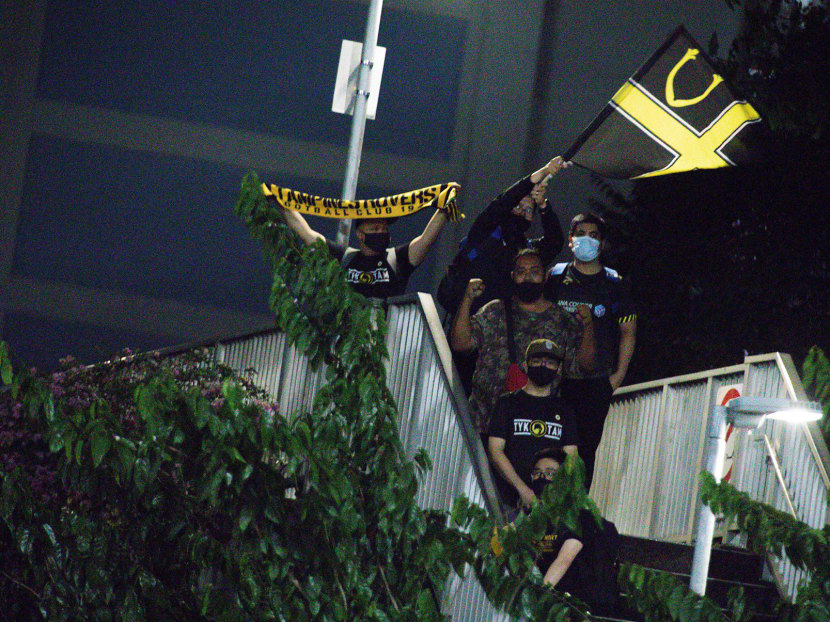
Tampines Rovers supporters watching a Singapore Premier League match between Balestier Khalsa FC and Tampines Rovers FC from an overhead bridge near Toa Payoh stadium on March 17, 2021. Photo: Ili Nadhirah Mansor/TODAY
Justin: In light of the disappointment over past failings, what is your message to Singaporeans to rally them around this project?
Bernard: To have a good Singapore football team and for Singapore to excel in sports, the whole community needs to support the venture and needs to support our athletes... what I'm asking for is, please support our children, because ultimately they're the ones who will go through the pipeline and deliver glory to Singapore. We have a dream. We will facilitate that dream. We will put in place the structures that will enable the children to achieve those dreams. What we're asking for is parents to support the kids and for the community to do so as well. Teck Yin was saying whether we can keep certain areas free for kids to play. To me, that's necessary, because kids have too few places to play. So if older footballers (can) take the slots at 9pm to 11pm to play because that's when kids can’t play… let the kids have slots that can fit into their school timetable. All of us as a community can play our part. And what I'm asking for is the whole of Singapore to come together to achieve this dream.
